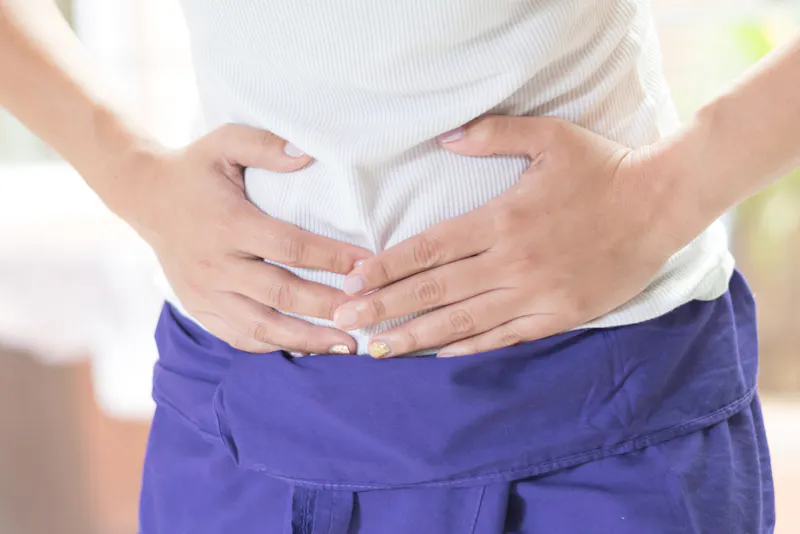Crohn's disease: causes, symptoms & management
What's covered?



Crohn’s disease is an autoimmune condition where your body mistakenly attacks the tissues in several parts of your digestive system.
What is Crohn's disease?
Crohn's disease is a type of inflammatory bowel disease (IBD). This long-term condition can affect any part of your digestive system from your mouth to your anus. It causes inflammation in the lining of your digestive tract that eventually spreads to the deeper layers. You can develop Crohn’s disease at any age, but symptoms most commonly start in childhood and early adulthood.
What causes Crohn's disease?
The exact cause of Crohn's disease isn’t known, but there are certain factors that can play a role.
These include:
- your genetics — you're more likely to get it if a close family member has it
- your immune system mistakenly attacks your digestive system
- a previous stomach bug that might trigger it
- smoking
- an imbalance in your gut bacteria
There’s no evidence to suggest that diet or lifestyle factors directly cause Crohn's disease.
Learn more about gut health and what you can do to support it.
What are the symptoms of Crohn's disease?
Signs and symptoms of Crohn's disease differ from person to person. These symptoms can be mild or severe and might flare up suddenly without warning. You might also have a time with no symptoms (remission).
When the condition is active, you can experience:
- diarrhoea
- vomiting
- stomach cramps
- fever
- blood in your poo
- tiredness (fatigue)
- no appetite
Crohn’s disease can also sometimes affect other parts of your body and cause things like arthritis, skin rashes and eye problems.
You should see your GP if you have any of these symptoms.
How is Crohn’s disease diagnosed?
It's challenging to diagnose Crohn's disease because many other conditions of the stomach (gastroenteritis, irritable bowel syndrome, indigestion, food intolerance, or food poisoning) can cause the symptoms.
You should see a GP if you:
- have blood in your poo
- have regular stomach aches or cramps and diarrhoea for more than 7 days
- lose weight without trying
Your GP might ask you about your diet, any medicines you're taking, or if you have any family members with Crohn's disease.
They might take a blood and stool sample to test for inflammation that could indicate Crohn's disease. You might be referred to a gastroenterologist (someone who specialises in stomach issues) to have further tests like:
- a colonoscopy — where a camera is inserted into your bottom to check for signs of inflammation
- a biopsy — where a tiny piece of your bowel is removed and checked for inflammation
- magnetic resonance imaging (MRI) or a computed tomography (CT) scan to check your bowels
What are the complications of Crohn's disease?
Unmanaged Crohn's disease can cause some complications, so it’s important to see your GP if you have any symptoms.
Ulcers or fistulas
The inflammation in your bowels can cause painful open sores (ulcers) in your stomach lining. Some ulcers can push through your stomach lining, forming an abnormal connection between your intestine, skin, or other organs (fistula).
Bowel obstruction
The condition can cause the lining of your bowels to thicken. This thickening can cause scarring and narrowing of your bowel, which can block the flow of your stomach contents (known as bowel obstruction).
Nutrient deficiencies
Stomach pain, diarrhoea, and other symptoms might make it difficult for you to eat or for your body to absorb enough essential nutrients.
When you don't get enough vital nutrients, your body can’t function as it should, leading to deficiencies in some nutrients — like vitamin B12, vitamin B9 (folate), and iron.
In return, these deficiencies could cause vitamin B12 deficiency anaemia or iron deficiency anaemia.
Your ability to absorb vitamin D may also be impaired.
A vitamins blood test can help you rule out or manage a nutrient deficiency.
Find out more about the role of vitamins and minerals in your body.
How to treat Crohn’s disease
Unfortunately, there’s no cure for Crohn's disease. But many treatments can help prevent flare-ups of the condition.
A gastroenterologist might recommend the following medicine:
- A steroid like budesonide or prednisone to reduce inflammation in the digestive system
- A liquid diet (enteral nutrition) — special drinks that contain all the nutrition you need — can also help reduce symptoms if taken for a few weeks
- Immunosuppressants — like azathioprine, mercaptopurine or methotrexate. These slow down your immune system to stop it from attacking your bowel lining.
- If the above medicines don't work, your specialist might prescribe a more potent biological medication (these are man-made proteins that target the immune system and inflammation, like adalimumab, infliximab, vedolizumab or ustekinumab).
Sometimes in severe cases, someone with Crohn's disease can have surgery to remove inflamed parts of their bowel if medicines make no difference.
How to manage Crohn’s disease
Although living with Crohn’s disease can be tricky, you can still have a normal life if your symptoms are well managed. Here are some of the aspects of life you need to consider when you have Crohn’s disease:
Diet
Most people with Crohn's disease can live a normal life without following a special diet if their symptoms are under control. Sometimes people avoid food because it can trigger symptoms. This can put you at risk of deficiencies. It's important to maintain a healthy weight and balanced diet, and to see a dietitian if you are struggling with this.
Some foods might trigger your symptoms more than others. It might be helpful to keep a journal of these and avoid them if possible
Minor changes to your diet, like avoiding spicy or high-fibre foods, can help you manage some symptoms. But if a food type or group makes no difference to your symptoms, don't exclude it — it might cause you to miss essential nutrients.
A balanced diet includes:
- at least 5 portions of fruits and vegetables a day — you might need to limit your fibre intake if you have a flare-up or if you are at risk of obstruction from gut narrowings (called strictures). A dietitian can advise you on getting essential nutrients in these cases or if you have trouble digesting certain fruits and vegetables.
- Carbohydrates — like pasta, bread, rice, potatoes, and sweet potatoes are high in energy. You might find that some sources of carbohydrates trigger bloating and diarrhoea.
- Protein — like lean meat, poultry, fish, beans, peas, and lentils — some legumes might trigger your symptoms because of the high fibre content.
- Dairy foods — like cheese, milk, yoghurt and fortified soya milk are good sources of calcium and vitamins. Speak to a dietitian if you're lactose intolerant to ensure you're getting enough vitamins in your diet.
A high-quality food supplement might also help to prevent deficiencies if you struggle to eat enough of some foods.
Always speak to your GP before starting a supplement or changing your diet.
Smoking
Stopping smoking can help reduce the severity of symptoms of Crohn’s disease and also reduces the risk of symptoms recurring. You can seek the help of a smoking cessation service to help you quit.
Medicines
Some medicines you buy from the pharmacy might trigger symptoms and interfere with your Crohn’s disease medicine. An example of this is an over-the-counter painkiller like ibuprofen. Other medicines of the same class (like diclofenac, high-dose aspirin and naproxen) should also be avoided.
Always check with your GP or pharmacist before buying and taking medicine from the pharmacy, especially ibuprofen or drugs to relieve stomach cramps or diarrhoea.
Your immune system
Taking immunosuppressant medicines like azathioprine, methotrexate, and mercaptopurine might easily get ill with the flu or other infections. If you take these, avoid vaccines that contain live viruses (like the MMR vaccine).
Vaccines that don’t contain live viruses, like the yearly flu and the one-off pneumonia vaccine, can help protect you against flu and serious illnesses like pneumonia, sepsis (blood poisoning) or meningitis.
Pregnancy
You'll most likely have a risk-free pregnancy and healthy baby even with Crohn’s disease. But some medicines you take for the condition might harm an unborn baby so you should inform your GP immediately if you:
- get pregnant accidentally
- plan a pregnancy
Don’t stop your Crohn’s disease treatment without advice from your GP first.
Crohn’s disease will likely not affect your fertility, but it might be harder to get pregnant during flare-ups. Some medicines for Crohn’s disease might also reduce sperm counts and egg production temporarily.
Mood and stress
Mood problems like depression and anxiety are common in Crohn’s disease. Stress can also play a role in triggering a flare-up.
Psychological therapies like cognitive behavioural therapy, hypnotherapy and mindfulness meditation can help with psychological symptoms. They may improve symptom control and quality of life and can also be used to help Crohn’s related pain where no physical cause is found.
Bowel cancer risk
Crohn’s disease might increase your chances of bowel cancer. Your risk is low at first but increases the longer you have the disease, for example:
- 1 in 50 after 10 years
- 1 in 10 after 20 years
- 1 in 5 after 30 years
You might be recommended regular colonoscopies if:
- you’ve had Crohn’s disease for 10 years or more
- several parts of your bowel are affected by the disease
Where to get support for Crohn's disease
Support groups like Crohn’s and Colitis UK are great resources for extra information. You can find information on all aspects of Crohn’s — on things like treatment, symptoms and diet — and area is a great source of support.
National Health Services (2021), Crohn’s disease. Retrieved 10 August 2022 from https://www.nhs.uk/conditions/crohns-disease/
Clinical Knowledge Summaries. Crohn’s disease [online; accessed 8 September 2022]
Chiarello MM, Pepe G, Fico V, Bianchi V, Tropeano G, Altieri G, Brisinda G. Therapeutic strategies in Crohn's disease in an emergency surgical setting. World Journal of Gastroenterology. 2022 May 14;28(18):1902-1921. doi: 10.3748/wjg.v28.i18.1902. PMID: 35664965; PMCID: PMC9150057. (https://www.ncbi.nlm.nih.gov/pmc/articles/PMC9150057/)
Lamb CA, Kennedy NA, Raine T, et al. British Society of Gastroenterology consensus guidelines on the management of inflammatory bowel disease in adults [published correction appears in Gut. 2021 Apr;70(4):1]. Gut. 2019;68(Suppl 3):s1-s106. doi:10.1136/gutjnl-2019-318484